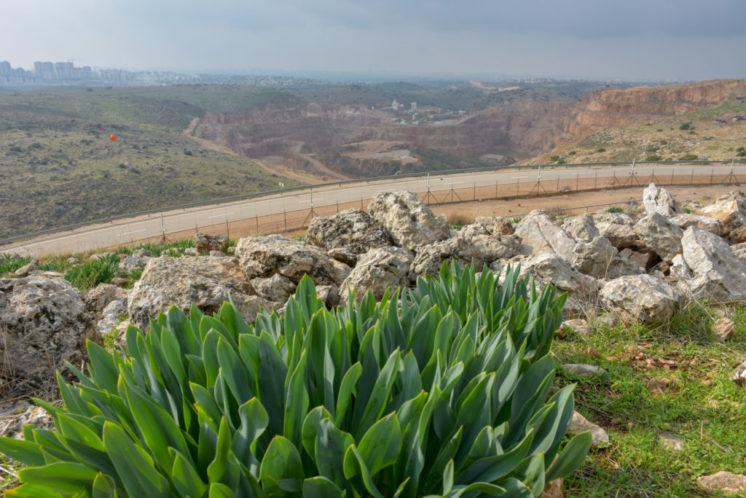German multinational HeidelbergCement has been quarrying in appropriated Israeli occupied Palestinian territory since 2007. HeidelbergCement’s actions and response when confronted with allegations that the company is contributing to the crime of pillage by Israel (an Occupying Power) and the construction of illegal Israeli settlements in the West Bank, exemplify how business interests and oppressive State policies work together to infringe on human rights.
 Photo: Nahal Raba Quarry
Photo: Nahal Raba QuarryThis case study is based on the full report ‘Violations set in Stone’ authored by Al Haq and SOMO in the context of the Mind the Gap project.
Hanson Israel, the subsidiary of HeidelbergCement AG, operates the Nahal Raba quarry which is situated on private and public land belonging to the Palestin ian villages of Al-Zawiya and Rafat[1], in the occupied West Bank, and has been confiscated by Israeli authorities in the early 1980s.[2] The land confiscations has denied Palestinians their rights to access and develop their land and deprived them their property. The land confiscation for the benefit of the quarry continues until today. In February 2019, an Israeli military order announced the confiscation of additional privately-owned land from the Rafat village, which was declared ‘State land’ so it can be allocated to Hanson Israel (HeidelbergCement’s subsidiary) for expanding the Nahal Raba quarry.[3]
By exploiting confiscated land and contributing to the construction of settlements, HeidelbergCement helps to perpetuate and further entrench the occupation and annexation. It also contributes to further de-develop the Palestinian economy, as most Palestinian operators are denied access to and development of stone reserves in specific parts of the West Bank.[4] Meanwhile, the company takes advantage of Israel’s colonial policies, quarrying on lands that were confiscated for exactly that purpose.
HeidelbergCement, like all Israeli and multinational companies active in the West Bank, operates under the jurisdiction of the Israeli Civil Administration (ICA), which issues mining permits and collects licensing fees from stone quarries, in the form of royalties. These royalties are then redistributed to fund settlement regional councils,[5] which constitutes another form of material support to the illegal settlements’ construction and expansion.
Not only does HeidelbergCement rely on the occupying State’s policies and measures of land confiscations and other forms of control over Palestinian land and natural resources, it also ignores the military occupation and claims to operate in line with international law. When being confronted with the illegal nature of its activities in the occupied Palestinian territory, such as its contribution to the crime of pillage, HeidelbergCement typically denies its involvement in human rights violations and grave breaches of international law. It uses the Occupying Power’s (Israel) narrative to deflect allegations of and deny its involvement in these violations and breaches. During the review procedure of the research report Violations Set In Stone, authored by Al-Haq and SOMO, HeidelbergCement stated that “[t]he exploitation of the quarry in Area C is legal under international law” and that it “deem[s] [its] operations in line with IHL statutes, as confirmed by confirmed by the Israeli High Court of Justice in its ruling.”[6]
Finally, HeidelbergCement disseminates false information regarding its operations in the Nahal Raba quarry and its corresponding responsibility. It claims that their quarrying activities on confiscated land benefit the local Palestinian population, citing employment and development: “Royalties and leasing fees are used by Israel for local projects, for example infrastructure projects, in Area C.”[7]
However, reality is that Heidelberg’s payments serve to support the development and expansion of illegal settlements, rather than Palestinian communities. As for employment of Palestinians in the quarry: due to the catastrophic economic impacts of the occupation, Palestinians are often financially compelled to work in settlements, constructed on unlawfully confiscated land that would otherwise have been for the use and benefit of their community.
[1] “Violations Set in Stone – HeidelbergCement in the Occupied Palestinian Territory,” Al-Haq and SOMO, February 2020, https://network.somo.nl/wp-content/uploads/2020/02/ViolationsSetInStone-EN.pdf, page 9, (accessed 25 June 2020).
[2] “Occupation Inc. – How Settlement Businesses Contribute to Israel’s Violations of Palestinian Rights,” Human Rights Watch, January 2016, https://www.hrw.org/report/2016/01/19/occupation-inc/how-settlement-businesses-contribute-israels-violations, hereinafter, Human Rights Watch, Occupation Inc.), (accessed 22 June 2020).
[3] A. Nieuwhof, “German Firm Escalates its War Crimes Against Palestinians,” Electronic Intifada, 10 June 2019, https://electronicintifada.net/blogs/adri-nieuwhof/german-firm-escalates-its-war-crimes-against-palestinians, last accessed 22 June 2020.
[4] Human Rights Watch, Occupation Inc.
[5] Who Profits, “The Israeli Exploitation of Palestinian Natural Resources: Part II HeidelbergCement.” November 2016, https://whoprofits.org/updates/the-israeli-exploitation-of-palestinian-natural-resources-part-ii-heidelberg-cement/ (accessed 22 June 2020).
[6] HeidelbergCement AG’s Director Group Communication& IR, email to SOMO, 20 December 2019.
[7] A. Nieuwhof, “German firm whitewashes its plunder of Palestinian resources,” Electronic Intifada, 14 September 2017, https://electronicintifada.net/blogs/adri-nieuwhof/german-firm-whitewashes-its-plunder-palestinian-resources, last accessed on 22 June 2020.
